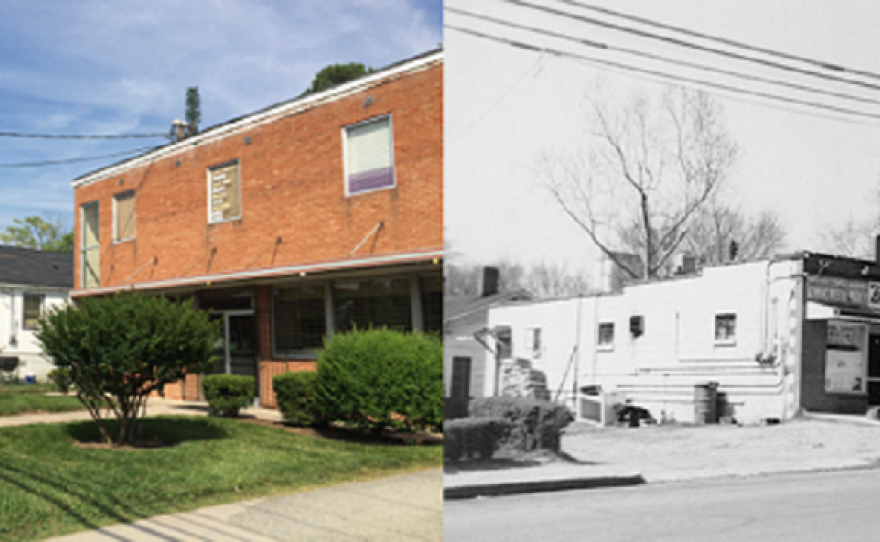The phone rings for the the fourth or fifth time in so many minutes inside a soul food joint in Durham, North Carolina. The place looks more like an accountant’s office than a restaurant.
“Chicken Hut,” answers matriarch Peggy Tapp. “Yes ma’am, we are.”
The Chicken Hut has opened and closed locations and faced family tragedies. The city even built a freeway through it. But they serve the same chicken they have been dishing up since they opened in the 1950s.
Peggy reads into the phone receiver from a tattered notebook in a soft voice: “Okay, today we have salmon patties, baked chicken with gravy, barbecue beef ribs, country smothered pork chops, collards, rice, mac ‘n cheese, fried okra, mashed potatoes, butter bean with corn.”
The Chicken Hut is a Durham institution. Claiborne Tapp, Jr., Peggy’s husband, opened the Chicken Hut in 1957 — they think it’s the oldest black-owned restaurant in the city. Claiborne had studied biology and was a poultry farmer by trade when he created the business.
At one point, Claiborne had five Chicken Huts in Durham and Chapel Hill, but before he died in 1998, the family downsized the chain to just their flagship store, a few blocks south of the historically black North Carolina Central University. He had a stroke, and worried that five restaurants was too many for his wife to run by herself.
Peggy and her two sisters worked in the restaurant as teenagers. Claiborne was Peggy’s boss before he was her husband. Ruth Dash left the restaurant to work in a high school, but returned when Claiborne fell ill.
“She really needed some help,” says Dash. “I told my husband I would stay here for a little while to help Peggy and then I would move on, but here I am 20 years later still helping Peggy.”
Chicken Hut is in a neighborhood with a strong legacy of black entrepreneurship. Other black-owned businesses, though, have struggled to keep the doors open.
The official end of the Jim Crow era in 1964 integrated the south, but North Carolina Central University Archivist Andre’ Vann says it was a double-edged sword.
“Some African-American institutions still flourished, but many were moved by the wayside because African-Americans no longer only had to go to those African-American institutions,” he told the Indy Week.
“We were able to go places we hadn’t been able to,” says Peggy. “So that kind of hurt businesses.”
Still feeling the sting of integration, businesses in the Hayti neighborhood — once famed for being the “Black Capital of the South” — were hit with devastating news: In 1958, Durham planned to “revitalize” the neighborhood. This urban renewal plan included building a freeway right through the area that would displace many of the black-owned businesses — including Chicken Hut.
The city offered to relocate Chicken Hut’s original location and other black-owned businesses to Tin City, a building that would house them all under one roof. The Tapp’s opted instead to buy land south of Hayti on Fayetteville St. and rebuild from the ground up. That’s where their flagship store stands today.
“It’s a struggle. You are not going to have everything peaches and cream,” says Peggy, glancing at her son Tre. “You have to be a fighter and I am a fighter, and his daddy was a fighter, and I think he is going to be a fighter.”
Some 50 years since they were forced to move, the Tapps are confident that Chicken Hut will continue for years to come. They trust their community and they trust God. Anyone who walks in the door can get a hot lunch, regardless of whether or not they can pay full price, or “even if you just have a nickel in your pocket,” says Peggy.
“You give a little and you get a little. That’s just how it is,” she says.
And, of course, it doesn’t hurt to have great chicken. Their secret family recipe, their own ratio of spice to flour, double fried, gives customers the satisfying crunch they are looking for.
Driving through southern Durham, there is no shortage of fried chicken options, but none have garnered Chicken Hut’s loyal following, the kind it take 60 years to build.
“Even in college, I majored in business management because I knew I was going to come and pursue taking over the restaurant,” says Tre, 39. “So I really can’t imagine doing anything else.”
Tre stepped in after college to oversee daily operations in 2000, and now his two daughters, the third generation of Tapps at Chicken Hut, are growing up around the kitchen just like he did.
Leah and Jade Tapp watch videos and giggle behind the counter, as their grandmother and the rest of the Chicken Hut staff scramble to get ready for the impending lunch rush. They say one day, they too will take over the family business.







